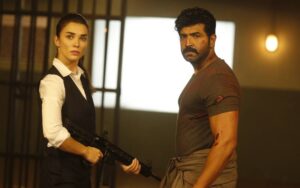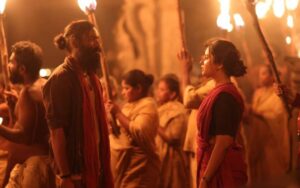Review – Kaala

Film: Kaala Karikaalan
Director: Pa Ranjith
Cast: Rajinikanth, Nana Patekar, Eswari Rao, Huma Qureshi, Samuthurikani, Sampath Raj, Sayaji Shinde, Anjali Patel, Manikandan, Dileepan, Pankaj Tripathi, Arul Doss,
Dileepan, Ramesh Thilak, Aravind Akash, Sakshi Aggarwal,Arundhati and others.
Music: Santhosh Narayanan
Cinematography: Murali G
Editing:Sreekar Prasad
Superstar Rajinikanth’s Kaala Karikaalan is an engaging, informative entertainer that tells what will happen if the powerful and the greedy try to usurp the lands of the urban poor using deceit and strength. Without mincing words, Ranjith’s Kaala points out that while for the rich, land is a source of power, it is a source of survival for the urban poor and the economically deprived. The movie clearly puts out the message that one’s land is one’s right.
The film begins with a series of animation slides that tell about how humans began settling down from being hunters and gatherers, after beginning to own land. He underlines the significance of land as a factor in the struggle to acquire power.
Getting on with the story, the plot begins in Dharavi, which is practically ruled by Kaala Karikaalan (Rajinikanth). The ageing don happily resides with his wife Selvi (Eswari Rao) and his four sons and their families in this slum. For those looking to usurp the land in the slum under the pretext of development and clean city, Kaala is a nightmare. A dreaded don who will drink their blood. To the scores of weak and helpless people residing inside the slum, he is a guardian. The slum has absolute confidence in Kaala and makes it a point to back him to the hilt as and when the occasion demands. After all, the man and those before him have been protecting their interests for years.
Now, the slum is of interest to a great many people as it is on land that is at the heart of one of the costliest cities of the world. One of them who has for long been harbouring dreams of owning that land is a ruling party representative, a small don (played by Sampath) who is slowly but steadily growing in the party. However, he knows he can do little with Kaala around. So, he keeps his temper in check and waits for his opportunity to wrest the slum from the clutches of the iron-willed, powerful and popular don.
Sampath’s hope is in the elections that are round-the-corner. He believes that the ruling party will sweep the state and in the process, the constituency too, thereby weakening Kaala’s hold over the slum. However, Kaala’s popularity is so huge and the slum’s loyalties so strong that although Sampath’s party wins every other constituency in the city, it fails to capture Dharavi, where Kaala’s candidate wins handsomely.
The defeat in the elections leaves the ruling party agents red faced. The defeat in particular is crushing for the local don who, in a hasty move, plans to kill Kaala. The move misfires and Kaala escapes. However, they vent their anger on a youngster from the slum by hanging him from a street lamp. The move provokes the lion into action.
Kaala chooses to hit back and hacks Sampath to death on a bridge. That brings him in conflict with Sampath’s master, a notorious politician called Haridev Abhayankar (Nana Patekar), who is drunk on power. Hari believes that he is born to rule and will stop at nothing to usurp lands of the weak and the poor. Hari is someone who is used to seeing people bowing down to him. Kaala is someone who refuses to bow to anybody in the world. The two decide to take on each other for reasons that they deeply believe in. Who will emerge victorious? Kaala gives you the answer…
Director Ranjith deserves a round of applause for having explained well the difficulties that slum dwellers face. In the course of narrating an interesting conflict between two very powerful people, he brings to light the fact that that those in the slums have to struggle for even simple needs like a clean toilet or for some much needed privacy. For instance, there is a dialogue in the film when Zareena (played by Huma Qureshi) goes about the slum asking the inmates how they would like their slum to be redesigned. One woman says,’ We need to have some space for privacy in our homes. Forget kissing my husband, I would have to wait late into the night to even hold his hand.’ These are very real issues that only those who have been to slums or worked in slums would know about. Probably, this is the first time such problems are being highlighted in a film.
The director keeps Kaala’s character rooted to reality. Unlike most of Rajini’s earlier films, in which he is shown doing things that are usually far-fetched and exaggerated, Ranjith treats Rajini’s character, Kaala, as a human being with limitations. This is not to say that Kaala’s character does not have its moments.Kaala scores on occasions against his rivals and the manner he scores is showcased in such a fashion that as a viewer, you are convinced about both the victory and the process by which he has earned it. For instance, the first meeting between Hari and Kaala in Dharaavi is a classic example.
The film has a number of outstanding performances. Rajini has done a fine job in this film and deserves a big round of applause for his work as Kaala. The superstar might be ageing but he has done so gracefully in this film. Nana Patekar as Haridev Abhayankar is brilliant. He masterfully handles his character and steals the show, often overshadowing even Rajini, around whom the plot is woven. The film also has exceptional performances coming in from at least six other actors. First among these is Samuthirakani, who plays Kaala’s loyal friend. Samuthirakani, a National Award winning actor, plays the role of this drunkard friend to perfection. Huma Qureshi, who plays Zareena, plays a mature woman to perfection. Her expressions are meaningful, neat and measured.
Next in line for appreciation is Sampath as the Ruling party’s don in the slum. His role and his performance are what get the film’s story moving. Dileepan, who plays Rajini’s son and trusted general when it comes to launching attacks or defending territories, impresses as does Anjali Patel, who comes up with a fiery performance as a vociferous rights activist in the slum. Eswari Rao, who plays Selvi (Rajini’s wife), delivers a memorable role.
On the technical side, the film has some really good background score by Santosh Narayanan. The music director seems to have scored music out of his skin for this film. Rajini’s intro scene is in fact one of the best in recent times, thanks primarily to Santhosh’s music.
Cinematographer Murali G’s camera has brought to life Ranjith’s story. Murali’s visuals are outstanding, any which way you choose to look at it. They keep you glued to the screen and hooked to the story. Be it lighting, angles, colour or shots, the cameraman seems to have got them all right, each time, every time.
Sreekar Prasad’s editing is just about right. The film has just one drawback and that is the manner in which it ends. The realistic portrayal of events gives one the impression that the anti-hero has been more succesful For ardent fans of Rajinikanth, the end might come as a surprise and a little disappointing too. But then, the point that the director is trying to make is much bigger than any one individual
Kaala Karikaalan, in short, is a film that needs to be watched, not only because it is a Rajini film but also because it has a very powerful and valid story to tell.





